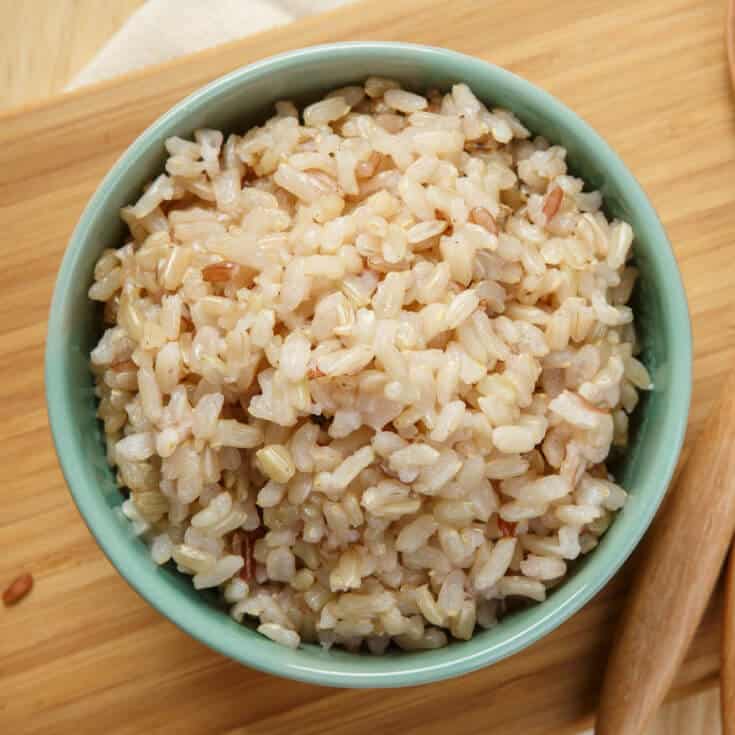This Dr. Axe content is medically reviewed or fact checked to ensure factually accurate information.
With strict editorial sourcing guidelines, we only link to academic research institutions, reputable media sites and, when research is available, medically peer-reviewed studies. Note that the numbers in parentheses (1, 2, etc.) are clickable links to these studies.
The information in our articles is NOT intended to replace a one-on-one relationship with a qualified health care professional and is not intended as medical advice.
This article is based on scientific evidence, written by experts and fact checked by our trained editorial staff. Note that the numbers in parentheses (1, 2, etc.) are clickable links to medically peer-reviewed studies.
Our team includes licensed nutritionists and dietitians, certified health education specialists, as well as certified strength and conditioning specialists, personal trainers and corrective exercise specialists. Our team aims to be not only thorough with its research, but also objective and unbiased.
The information in our articles is NOT intended to replace a one-on-one relationship with a qualified health care professional and is not intended as medical advice.
Why You Should Try the Green Mediterranean Diet Plan (Benefits, Recipes & More)
March 16, 2025

Many health experts consider the Mediterranean diet to be one of the most optimal ways to eat for disease prevention and longevity. A typical Mediterranean diet food list includes things like veggies, whole grains, fish, some cheeses, nuts and fruit. However, a recent spin-off of the diet, called the “green Mediterranean diet,” focuses on plant foods that are commonly eaten in the Mediterranean region, such as Italy, Greece, Spain and Turkey.
Research has even indicated that a green Mediterranean diet might be even more powerful at improving cholesterol, blood pressure, body weight and markers of inflammation compared to a Mediterranean diet that includes more meat.
What is the green Mediterranean diet?
The green Mediterranean diet, also called “green Med,” is a mostly vegan diet that emphasizes whole, unprocessed plant foods. The diet includes very little or no meat and minimal animal products.
According to an article published by the journal BMJ, green Med may be even better for health than the traditional Med diet that includes more animal-derived foods, such as poultry, cheese and meat.
While a traditional Med diet is known to promote heart and metabolic health, fight obesity and diabetes, and contribute to greater quality of life in older age, a green Med diet contains more plant foods, along with green tea and the sea vegetable known as Mankai (or duckweed), which are loaded with disease-fighting antioxidants.
How it works
A green Mediterranean vegan diet, or that’s close to being vegan/vegetarian the majority of the time, is capable of improving health by providing essential vitamins, minerals and fatty acids, plus lots of fiber, phytonutrients and antioxidants.
Research published in the journal Heart suggested this type of Mediterranean diet can help lower one’s risk of coronary heart disease, stroke and diabetes.
These effects are thought to be due to high intake of polyphenols from foods/drinks like veggies, tea and seaweed; healthy fats from olive oil, nuts and seeds; and fiber from veggies, whole grains and fruit. At the same time, the green Med diet includes less saturated fat from red meat and little added sugar and other chemicals from processed foods.
Benefits
According to studies, following a green mediterranean diet plan can support cardiovascular, metabolic, cognitive, gut and immune health.
Here are some of the benefits linked to this type of plant-based diet:
- Lower risk for heart disease and stroke
- Protection against obesity and improved waist circumference/BMI (lower waist circumference is linked to metabolic health)
- Reduced risk for type 2 diabetes and metabolic syndrome
- Decreased hunger and cravings due to higher fiber and nutrient intake
- Improved cholesterol and blood pressure
- Enhanced insulin sensitivity
- Lower markers of inflammation
1. Helps lower cortisol
A study published in 2023 found that long-term adherence to green-Mediterranean diets, particularly those high in polyphenols, may lower fasting morning cortisol levels, a stress hormone. This reduction could have potential benefits related to cardiometabolic health, independent of weight loss.
More specifically, the DIRECT-PLUS clinical trial investigated the effects of the green Mediterranean diet on fasting morning cortisol (FMC) levels over an 18-month period. This randomized, controlled trial included 294 participants who were assigned to one of three dietary interventions:
- Healthy Dietary Guidelines (HDG): Participants followed standard healthy dietary recommendations.
- Mediterranean Diet (MED): This group adhered to a calorie-restricted, lower-carbohydrate Mediterranean diet, which included 28 grams of walnuts per day.
- Green Mediterranean Diet (green-MED): In addition to the components of the MED diet, this group consumed three to four cups of green tea daily and a green shake made from the aquatic plant Wolffia-globosa (Mankai), both rich in polyphenols.
After 18 months, both the MED and green-MED groups experienced significant reductions in FMC levels compared to baseline measurements. Specifically:
- MED Group: A decrease of 1.6% (approximately 21.45 nmol/L).
- green-MED Group: A decrease of 1.8% (approximately 26.67 nmol/L).
- HDG Group: An increase of 4% (approximately 12 nmol/L), though this change was not statistically significant.
The reduction in FMC levels in the green-MED group was significantly greater compared to the HDG group, suggesting a potential advantage of the green Mediterranean diet in lowering cortisol levels.
2. Supports brain health
Dietary patterns rich in plant-based foods, such as the green Mediterranean diet, have been associated with neuroprotective effects. A comprehensive review indicated that these diets might help prevent age-related cognitive decline and improve cognitive function, potentially due to their high polyphenol content.
A study published in 2022 examined the impact of the green-MED diet on brain atrophy over 18 months. Participants following the green-MED diet experienced a significant attenuation of age-related brain atrophy compared to control groups, suggesting potential neuroprotective benefits.
Further analysis from the same trial indicated that both Mediterranean and green-MED diets were associated with a reduction in brain atrophy by approximately 50% over 18 months. This suggests that adherence to these diets may help preserve brain volume during aging.
3. Boosts heart health
A randomized, controlled trial investigated the effects of the green-MED diet on cardiometabolic health and its association with gut microbiome modifications. The study found that adherence to the green-MED diet led to significant improvements in cardiovascular risk factors, including reductions in blood pressure and cholesterol levels.
These benefits were linked to favorable changes in the composition of the gut microbiome.
Another study examined the impact of the green-MED diet on visceral adiposity and related inflammatory proteins. Participants following the green-MED diet experienced significant reductions in visceral fat and pro-inflammatory proteins associated with cardiovascular disease risk.
4. Aids weight maintenance and burns visceral fat
The 18-month DIRECT PLUS study already mentioned compared the effects of the green Mediterranean diet, a traditional Mediterranean diet and healthy dietary guidelines on visceral adipose tissue. Participants following the green-MED diet experienced a 14.1% reduction in visceral adipose tissue, significantly greater than the 4.2% reduction in the healthy guidelines group and the 6.0% reduction in the traditional Mediterranean diet group.
This suggests that the Green-MED diet is particularly effective in reducing visceral fat.
The green Mediterranean diet has also been associated with significant reductions in intrahepatic fat, which is closely linked to metabolic health. Participants adhering to the Green-MED diet showed a median reduction of 38.9% in intrahepatic fat content, compared to 19.6% in those following the traditional Mediterranean diet and 12.2% in the healthy dietary guidelines group.
5. Lowers risk of diabetes
A large primary prevention trial found that adherence to a Mediterranean diet resulted in a lower incidence of major cardiovascular events and diabetes, and that includes the green Mediterranean diet.
Another study investigated the effects of Wolffia globosa Mankai, a green aquatic plant incorporated into the green-MED diet, on postprandial glycemic responses. The findings suggested that Mankai may serve as an alternative plant protein source with beneficial effects on postprandial blood glucose levels.
Research has shown that the green-MED diet also induces significant changes in gut microbiome composition during weight loss phases. These microbiome modifications have been associated with improved glycemic control, suggesting a link between diet-induced microbiome changes and blood sugar management.
6. Promotes better sleep
While direct research on the green Mediterranean diet’s impact on sleep is limited, certain components of this diet have been associated with improved sleep quality.
For instance, the green Mediterranean diet emphasizes plant-based proteins, such as duckweed, which are rich in tryptophan. Tryptophan is an amino acid that serves as a precursor to serotonin and melatonin, neurotransmitters involved in regulating mood and sleep.
Incorporating foods high in polyphenols, like green tea and walnuts, may have a positive impact on sleep. Polyphenols possess antioxidant properties that can influence sleep regulation.
7. Protects the liver
The green Mediterranean diet has been associated with liver health benefits in human studies. For example, the study mentioned that investigated the effects of the green-MED diet on intrahepatic fat found this diet protects liver health too.
Participants adhering to the green-MED diet experienced a significant reduction in intrahepatic fat compared to those following other healthy dietary strategies. The study concluded that the green-MED diet, amplified with green plant-based proteins and polyphenols, can effectively reduce non-alcoholic fatty liver disease.
8. Reduces greenhouse emissions
Researchers analyzed the environmental footprints of the Mediterranean diet compared to Western dietary patterns. Results indicated that increasing adherence to the MED in Spain could reduce GHGEs by 72%, land use by 58% and energy consumption by 52%.
In contrast, adherence to Western dietary patterns was associated with increases in these environmental indicators.
Another study assessed the environmental footprint, specifically carbon footprint and water footprint, of three omnivorous diets recommended in Spain: the Mediterranean diet, the Southern European Atlantic diet and the Spanish dietary guidelines. The analysis revealed that the Mediterranean diet had a lower carbon footprint and water footprint compared to the other dietary patterns, highlighting its environmental benefits.
Given that the green Mediterranean diet further emphasizes plant-based foods and incorporates polyphenol-rich items like green tea and Mankai, it is plausible that this dietary pattern could offer additional environmental benefits, including further reductions in greenhouse gas emissions.
More benefits
When researchers from the 2021 Heart study mentioned above sought out to determine whether a greener version of the Med diet was even more protective against disease development, they found evidence that it was. Their data showed that a green Med diet is higher in green plant food sources and even lower in red meat intake than a regular Med diet, which seems to help with weight maintenance and heart health.
Authors of the study concluded: “Following a green Med dietary pattern in conjunction with physical activity has the potential to be a major contributor to public health….Our findings suggest that additional restriction of meat intake with a parallel increase in plant-based, protein-rich foods, may further benefit the cardiometabolic state and reduce cardiovascular risk, beyond the known beneficial effects of the traditional Mediterranean diet.”
Here are more details about the study and key benefits of the green Mediterranean diet that were uncovered:
The study included nearly 300 randomly assigned adults who were moderately obese and sedentary (with an average BMI of 31 and age of 51). Participants were split into three dietary groups:
- Those who received guidance on boosting physical activity and basic guidelines for achieving a healthy diet.
- Those who received the same physical activity guidance PLUS advice on following a calorie-restricted, traditional Med diet (1,500-1,800 kcal/day for men and 1,200-1,400 kcal/ day for women).
- Those who received physical activity guidance PLUS advice on following a similar calorie-restricted GREEN version of the Mediterranean diet.
Those following the green Med diet were told to avoid refined carbohydrates, red meat, poultry and processed meat and to emphasize vegetables and other plants, walnuts, several cups of green tea daily, and the aquatic plant called duckweed (also called Wolffia globosa, which is a cultivated Mankai strain that is high in protein).
After six months, the effect of each of the diets on weight loss and cardiovascular and metabolic risk factors was assessed.
Those on both types of Mediterranean diets lost weight. Those on green Med lost about 14 pounds on average (6.2 kg.), and those on the traditional Med diet lost about 12 pounds (5 kg.). Those following the “healthy diet” lost about three pounds ( 1.5 kg.).
Waist circumference decreased by an average of 8.6 centimeters among those on the green Med diet compared with 6.8 centimeters for those on the regular Med diet and 4.3 centimeters for those on the healthy diet.
The green Med diet group by far saw the most improvements in “bad” LDL cholesterol. Other cardiovascular and metabolic risk factors also significantly improved more among those on the green Med diet, including improvements in blood pressure, insulin sensitivity and markers of inflammation (such as C-reactive protein, which has a key role in artery hardening).
Foods and meal plan
What foods are on the green Mediterranean diet?
- High-fiber foods, including veggies, fruits, seaweed, nuts, seeds, beans, legumes and whole grains
- Plant proteins, such as legumes, beans, vegan protein powders and seaweed (including duckweed, which is high in omega-3s and protein)
- High-antioxidant foods, like all sorts of veggies, fruits, herbs and spices, plus teas
- Olive oil and nuts (especially walnuts) or seeds, such as hemp, chia or flax, for healthy fats
- Dairy, such as yogurt, eggs and fish, in small amounts
Is tea a part of the Mediterranean diet? Yes!
Green tea is highly encouraged due to its rich supply of antioxidants. Participants in the Heart study drank three to four cups of green tea per day.
Some red wine, in moderation, as well as coffee can also be included.
What foods are not allowed on the Mediterranean diet?
- Processed meats (like salami, hot dogs, cold cuts, etc.)
- Red meats
- Poultry and fish (only in very small amounts)
- Cheeses and dairy in high amounts
- Processed foods
- Added sugar
Can you have any packaged foods? For example, is oatmeal OK on the Mediterranean diet?
As much as possible, eat fresh foods, and limit things that have been processed. Read ingredient labels, and aim for foods with the least additives.
If you buy oatmeal, purchase products containing only whole/steel cut oats, instead of refined oats with added sugar and flavors.
How do you do the green Mediterranean diet?
The key is to eat plenty of plant foods, fiber and healthy fats.
Here’s an example of a green Mediterranean diet meal plan for one day:
- Breakfast: Smoothie made with vegan protein powder, plus chia seeds, fruit and spinach. Also have a cup of green tea or coffee.
- Lunch: Salad with beans, nuts, diced veggies and olive oil dressing. Also have plenty of water plus a cup of green tea.
- Dinner: Bean and veggie soup with salad and whole grain bread.
What are some recipes to try?
If you’re ready to ditch processed foods and eat a clean, plant-based diet, they these Mediterranean diet recipes:
- 30 Green Smoothie Recipes
- 30 Hummus Recipes
- Black Bean Burger Recipe
- Tuscan White Bean Soup
- Cucumber Tomato Salad Recipe
Risks and side effects
When following a plant-based diet, it’s important to make sure you consume enough protein. To prevent fatigue, weakness and increased hunger, include plenty of plant protein in your meals, such as beans, legumes and vegan protein powder.
Remember that even if you find it hard to eat entirely plant-based (or a vegan diet), you can still benefit from including a lot of plant foods in your diet and cutting out processed meats.
As always, if you have any medical issues and take medications, speak with your doctor before drastically changing your diet.
Conclusion
- Recent studies suggest that a “green Med” diet may be even better for health than the traditional Med diet that includes more animal-derived foods, such as poultry, cheese and meat.
- A green Med diet can promote heart and metabolic health, fight obesity and diabetes, and contribute to quality of life in older age.
- To follow this type of eating plan, consume more plant foods, along with green tea and seaweeds, to obtain lots of disease-fighting antioxidants and fiber.















